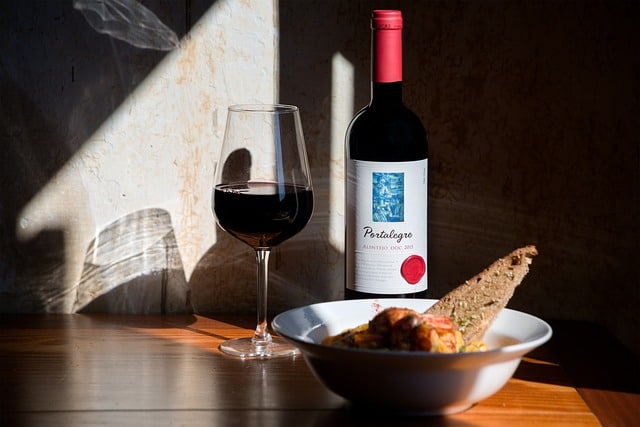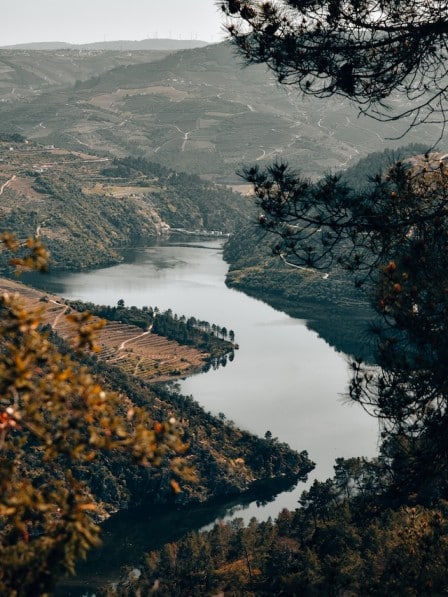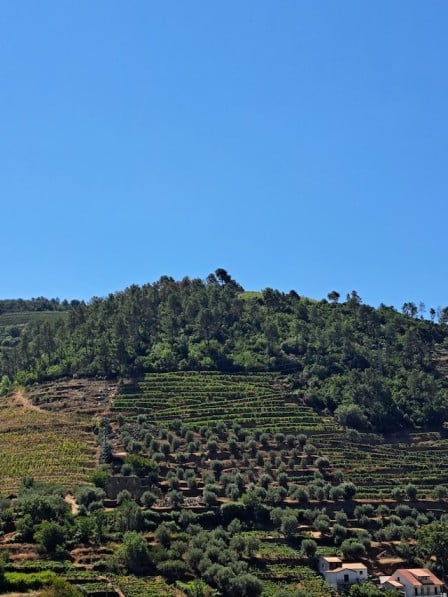Updated: April 23, 2024
Dreaming of owning a vineyard in the sunny Mediterranean? Well, you’ll certainly be able to find a vineyard for sale in Portugal that can cater to this desire. The Portuguese climate makes for some of the best wines in the world. Indeed, many winemakers from California are opting for Portuguese grape varieties for their vineyards.
So, where can vineyards for sale in Portugal be found? From the Douro Valley in the north of the country to the Alentejo closer to the south, Portugal has an array of optimum locations to own a winery. In this article, we will provide you with an overview of the history of wine in the country. Following this, we will delve into some of the most desirable locations for vineyards in Portugal.
How much does a Portuguese vineyard cost?
The price of purchasing a vineyard in Portugal will inevitably vary, depending on the size of the vineyard, in addition to the winemaking equipment.

In 2017, Sir Cliff Richard put his vineyard in the Algarve up for sale for around €87.2 million euros. Today, you may also be in a bidding war as there has been increased international demand for Portuguese vineyards, particularly amongst Asian buyers. When it comes to luxury properties, owning a vineyard may just top the list.
However, a farmyard with land suitable for growing wines can cost you a more modest €400,000. For an existing vineyard, with the equipment and premises, this will cost you around €1 million.
If you are interested in discovering a lovely farm, you’ll find many options. You can check out our article for more info: Best Places to Find Farms for Sale in Portugal.
As vines grow best in sunny climates, vineyards are normally incredibly beautiful properties, and they provide something a little different and a bit more special to other types of property in Portugal. Furthermore, if you are looking for a place of luxury and a suitable challenge, then maybe you can fulfill your younger dream and make owning a vineyard your new reality.
For other types of luxury homes, you can check out our article: What are the Main Types of Luxury Properties in Portugal? Whether you are looking for a beautiful mansion or waterfront property, there are many options up and down the country.
Investment Potential of Owning a Portuguese Vineyard
Given Portugal’s strong association with wine, coupled with the many excellent wine regions in the country, achieving a favorable return on investment through marketing and export sales is a real possibility. However, it will obviously take some years before you begin to generate a profit. With this said, the current high demand for vineyards in Portugal suggests that this is a highly desirable venture. If you are looking to buy a vineyard, the value of the property is likely to increase in the future, making it a lucrative investment in the long term.
Seek Expert Assistance
It is important to note that you cannot simply purchase land and plant vineyards. In Portugal, there is a quota, which means that if you would like to purchase or set up a vineyard, you will need to buy the rights from someone else.
It is a good idea to seek expert advice that can help you with these matters, including the licensing, legal aspects, and other practicalities of owning a vineyard.
History of Wine in Portugal
Portugal and vinho (wine) go hand in hand. Indeed, wine is very much part of the fabric of Portugal. As such, many families have small plots of land where they grow various grape varieties, fruits, and other produce. However, in the past decades, the EU revolutionized the winemaking process, upgrading the trellising system. Nonetheless, in many of the smaller villages, the traditional process of grape growing remains very much alive.

The first winemakers of Portugal
Wine in Portugal goes back a long way, to 2000 BC. The Tatressians cultivated wine for the first time in the Tejo and Sado valleys. Following this, the Phonecians seized the trade from the Tatressians around the 10th Century BC, including its wine, and it’s believed that they brought new grape varieties with them. Up until this time, wine cultivation in Portugal was very much concentrated in the south of the country.
The Greeks, Celts, and Romans spread winemaking in Portugal further North. From the 7th Century, the Greeks roamed the Iberian peninsula and brought the varieties of vineyards that they cultivated. These “Iberians” became one people with the Celts, ancestors of the Lusitanian – the Celtiberian – when they arrived in the 6th Century, bringing with them new techniques to winemaking.
The warrior expansion of Rome led to them finally securing the peninsula for themselves. They renamed the area Lustiana after Lusus, the son of Bachus, the Roman God of wine.
The expansion of the Roman Empire is very significant for modernizing wine cultivation in the country. They were responsible for bringing in new techniques and grape varieties. As wine consumption in Rome increased, its own production mechanisms were not sufficient to meet the increased demand. As a result, wine was frequently sent from the Iberian peninsula to cater to this demand in Rome.
England and Portugal’s trade ties
England and Portugal have long had a close relationship, with Portuguese wines shipped to England for the first time in the 12th Century. Trade continued with the popularity of Port wine in England at the start of the 18th Century.
Modern day wine in Portugal
Portugal’s ascension to the EU in 1986 opened the doors to grants, financing, winemaking techniques, and facilities. This enabled the wine trade in Portugal to trade with the rest of Europe. Today, Portugal is home to unique grape varieties. Wines from the Alentejo, Douro, and Vinho Verde regions are internationally recognized as being amongst some of the best in the world.
The Best Locations to Find Vineyards in Portugal
Portugal has the perfect climate for making wine and many scenic wine regions. As such, from the north to the south of the country, there are many beautiful vineyards.
Note that there may be vineyards for sale in Portugal that are not in the following regions. For example, you can get sparkling wines from Bairrada, just north of Coimbra, which are excellent. Bairrada produces 60 percent of all sparkling wines in the country. You’ll also find exceptional wines on the islands, such as Madeira wine from the Madeira islands.

Douro
The Douro region in north Portugal is perhaps the most well-known area for wines in the country. The famous Douro River, the third-largest river in the Iberian Peninsula, rushes through it, running all the way from the Spanish town of Duruelo de la Sierra to Porto, Portugal’s second largest city.
The Douro Valley is also a UNESCO World Heritage site but is perhaps best known as being the home to some of the finest red and white wines. Alongside this, the region is the home to Port, extremely favored by the British. Indeed, buying a vineyard in the Douro Valley places you in the very heart of Portuguese winemaking. Here, you have the perfect soil for a truly unique wine.
There is a key aging process in selected wooden casks in the cellars in Vila Nova de Gaia, overlooking the traditional charm of Porto City. Owning a vineyard close to here would be a very special experience. This is also where you’ll find Port wine, the delicious fortified wine that is well-known across the globe.
You can check out our article for more information on this stunning area of Portugal: Complete Douro Real Estate Guide.
Dão
The Dão region is located just south of the esteemed Douro Valley and is renowned as one of the chief-making regions for Portuguese wines. The name derives from the Dão River, along which most of the vineyards in the area are located.
Perhaps best known for its deep red wines made from Tinta Roriz and Touriga Nacional, you can also produce excellent white wine here, such as Encruzado, arguably Portugal’s finest white grape variety.
Alentejo
The Alentejo has previously been nominated as the best wine region to visit in the world by USA Today. The region occupies over one-third of continental Portugal. As such, the Alentejo is one of the most significant areas for wine production.
The warm, dry climate of the Alentejo is perfect for crafting wines. Although not as well known as the Douro in the north, there is now considerable international recognition of Alentejo wines.
If you were to enter any supermarket or wine shop in Portugal and purchase an Alentejo wine, it is extremely difficult to be disappointed.
You can read more about this delightful region in our article: Alentejo Portugal Real Estate Guide.
Vinho Verde
This is Portugal’s famous “green wine,” which is cultivated in the Minho province, to the north of Porto and bordering Spain. The modern-day Vinho Verde region stretches to adjacent areas of the south, as designated in 1908, and the old province was dissolved in 1976. However you define the boundaries, the incredible wines in this region speak for themselves.
Vinho Verde is not a grape variety but is a DOC (protected designated area of origin for wine production). This is a young wine, and it is released three to six months after the grapes are harvested, and the wine is consumed soon after bottling.
The Algarve
The Algarve is a very desirable location for expats. Outside the tourist areas, you have lush, fertile land that is perfect for cultivating wine.
Indeed, in the past decades, the Algarve region has exploded with new vineyards, and they are now amongst the best in the world. As an example, Sir Cliff Richard used to own a vineyard just north of Albufeira in the sunny south. With a hot climate, this area is also a good wine-making region and has many hectares dedicated to the craft. Finding a vineyard for sale in Portugal’s Algarve would make any wine-lover extremely happy.
Frequently Asked Questions about Where to Find Vineyards for Sale in Portugal
Where can you find vineyards for sale in Portugal?
There are many wine regions where you can find vineyards for sale in Portugal. In the south, you have the Alentejo, and in the North, you have the Douro and Dão regions. You also have wines in Portugal close to Lisbon and Setúbal.
Not just an incredible location to soak up the sunshine and enjoy stunning seascapes of the Atlantic Ocean, the Algarve also has many vineyards.
Each of these distinct areas has vineyards, but the wines produced vary considerably. For example, wine grown primarily in the Douro region is often full-bodied, while Alentejo wines are known as being more fruity.
What should you look out for when purchasing a vineyard in Portugal?
As such, we recommend seeking independent advice on the practicalities. This can include impartial advice on the price, the process of how you will need to buy the rights from someone else to be able to have a vineyard, plus legal and licensing guidance. You will also want to ensure that you are conveniently located to supermarkets, restaurants, and other amenities.
It is also worth speaking with an expert in wine production, who can provide you with some advice on the wine regions in Portugal and what area may be best suited to your tastes and requirements. You will find many grape types in Portugal, such as Touriga Nacional, Castelão, and Baja grapes.
Is purchasing a vineyard a good investment?
Luxury homes don’t get much better than owning a vineyard. As wine is synonymous with Portugal, it is fairly straightforward to generate a good rate of return on investment, with some marketing and export sales. Additionally, increased demand for vineyards in Portugal at the moment indicates that this is a much sought-after endeavor.
What are the best table wines in Portugal?
This will largely depend on your tastes, as Portugal has excellent red wines, white wines, green wines, fortified wines, and sparkling wines. Some of the best fortified wines are Port wine from the Douro Valley and Madeira from the Madeira islands. If you are looking for red wines, the Douro, Alentejo, and Dão regions are excellent. And, for something lighter, a Vinho Verde (green wine) should be your go-to, perfect for long summer evenings.
You will find many grape types in Portugal, such as Touriga Nacional, Syrah, and Baja grapes.
